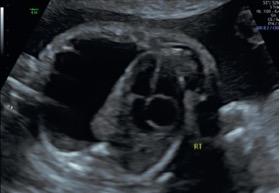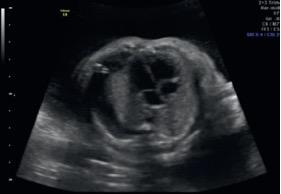Topics
How does fetal pleural effusion affect my baby?
The impact and prognosis varies widely depending on the amount of fluid that forms. The condition can also be unpredictable. In mild cases involving only a small amount of fluid, the condition may spontaneously resolve on its own.
In severe cases where a large amount of fluid accumulates and is compressing the fetal lungs, your baby’s lungs may be unable to grow and develop properly, resulting in pulmonary hypoplasia, or underdeveloped lungs. Untreated, these babies are at risk of severe, often fatal breathing problems at birth.
An extreme buildup of fluid can also push the fetal heart out of place, shifting it to the other side of the chest and impacting return blood flow to the heart. The baby’s heart may have to work harder, leading to heart failure and a life-threatening condition known as hydrops, or severe swelling, where excess fluid accumulates in multiple areas of the baby’s body including the lungs (pleural effusion), abdomen (ascites), around the heart (pericardial effusion) and under the skin (edema), causing organ failure.
Cause and Risk Factors
Fetal pleural effusion is rare, affecting an estimated 1 in 10,000 births.
The condition may be isolated, known as primary pleural effusion, or it may be the result of other conditions present, known as secondary pleural effusion.
Possible causes include abnormal lymph drainage (chylothorax), lung lesions, other lung conditions, heart conditions, chromosomal disorders, or infection. In many cases the cause is unknown.
Fetal pleural effusion may also be a sign of fetal heart failure and hydrops.
Diagnosis
Fetal pleural effusion may be detected during a routine prenatal ultrasound.
If fetal pleural effusion is suspected or diagnosed during pregnancy, you may be referred to a fetal center for further evaluation and specialized care.
At Texas Children’s Fetal Center, we arrange for you to visit as quickly as possible to meet with a team of specialists experienced in diagnosis and treating fetal pleural effusion, including maternal-fetal medicine (MFM) physicians, fetal imaging experts, fetal cardiologists, pulmonologists, and neonatologists.
Our specialists will perform a comprehensive evaluation and additional testing to help us gain more information about your baby’s condition and identify any other abnormalities.
Testing may include:
- Anatomy ultrasound to confirm the diagnosis, evaluate the fluid level around the lungs, and assess the risks to the fetus
- MRI for more detailed information about the severity of the condition
- Fetal echocardiogram to evaluate fetal heart structure and function
- Amniocentesis and chromosomal analysis to look for chromosomal anomalies
Following this detailed assessment, we will meet with your family about the results, answer any questions you have, and discuss treatment options based on the unique needs of your baby and pregnancy.
In some cases, fetal pleural effusion is not diagnosed until after the baby is born. Symptoms at birth may include difficulty breathing, feeding problems, and coughing.
Treatment During Pregnancy
You and your baby will be closely monitored throughout pregnancy with regular ultrasounds to assess the amount of fluid accumulating and the impact on your developing baby.
Fetal intervention to drain the excess fluid from the fetus’ chest may be considered if:
- The fetus is at risk of lung or heart failure (hydrops)
- Polyhydramnios occurs (too much amniotic fluid), increasing the risk of preterm labor
- Isolated pleural effusion occupies more than 50% of the fetal chest
- The size of the pleural effusion increases rapidly and the heart and other organs shift to one side of the chest cavity (mediastinal shift)
If fetal intervention is necessary, the recommended treatment steps are as follows:
- Fetal thoracentesis – In this minimally invasive, ultrasound-guided procedure, a thin needle is placed through the mother’s uterus and into the fetal chest to draw out the fluid. During the procedure, a sample of chest fluid and amniotic fluid may be obtained for testing to help determine the cause of the pleural effusion and identify any other fetal conditions or abnormalities.
- Evaluate the fetal lungs for re-expansion, following thoracentesis.
- Watch for rapid buildup of fluid again – If the fluid quickly reaccumulates, determine if a shunt (drainage tube) would be beneficial to prevent repeated buildup, especially if it is early in the pregnancy.
- Thoracoamniotic shunting – Under ultrasound guidance, a small plastic tube, known as a shunt or catheter, is placed in the fetal chest, with one end in the chest cavity and the other end extending out into the amniotic cavity, enabling continual drainage of the pleural fluid. This is known as a “double pigtail catheter” (Rocket or Harrison shunt).
By draining the accumulated fluid, fetal interventions can reduce the pressure against the fetal lungs and heart, improving lung development, heart function and fetal outcomes.
Fetal pleural effusion – before and after fetal intervention:


Delivery
Babies with fetal pleural effusion are at increased risk of breathing issues at birth and may require specialized treatment immediately upon delivery. We recommend delivery at a center with a neonatal intensive care unit (NICU) capable of caring for the most critically ill newborns, avoiding the need to transport your baby at birth.
Texas Children’s Hospital is home to the first NICU to be designated by the Texas Department of State Health Services as a level IV NICU, the highest level of care available for premature and critically ill newborns.
Delivery and postnatal care should be carefully planned and coordinated with a team of maternal-fetal medicine specialists, neonatologists, and pediatric specialists highly experienced in working together to treat babies with pleural effusion. Our fetal center team works closely with specialists from Texas Children’s Pulmonary Medicine and Cardiology departments, both ranked number one in the nation by U.S. News & World Report, ensuring the best possible care for your baby every step of the way.
The timing and type of delivery, vaginal or cesarean, varies based on the severity of the fetal pleural effusion and any intervention required. Pregnancies involving severe cases of fluid accumulation are at high risk of premature delivery.
Treatment after Birth
Treatment after delivery will depend on the severity of your baby’s condition, their lung and heart function, and the cause of the pleural effusion.
Your newborn may require specialized care in the NICU, including respiratory support and a chest tube to continually drain fluid from the chest cavity.
In some cases, surgery may be needed to repair a congenital defect or damage to the baby’s lungs caused by the fetal pleural effusion.
Postnatal Care Team
A unique and distinct advantage for mothers delivering at Texas Children’s Pavilion for Women is our location inside one of the largest and most renowned children’s hospitals in the world, for seamless access to the critical care services and specialists your baby may need after birth.
For newborns with rare conditions such as fetal pleural effusion, this means no transfers are required during the critical postnatal period. It also means that the pediatric experts responsible for treating your child at delivery and beyond have been part of their care team prior to birth.
Texas Children’s Hospital is consistently recognized as a leader in pediatric care by U.S. News & World Report, and has once again been named the best place in the country for children in need of pediatric cardiology, heart surgery, and pulmonary care.
Research
Our researchers are continually working to better understand the causes and characteristics of fetal pleural effusion, and the role of fetal intervention, to improve the care and treatment of patients around the world facing this diagnosis.
Learn more about our recent study of primary fetal pleural effusion.
Why Texas Children’s Fetal Center?
- A single location for expert maternal, fetal and pediatric care. At Texas Children’s Hospital, you and your baby can get the specialized care required for the diagnosis and treatment of fetal pleural effusion all in one location, for highly coordinated care and treatment planning, including immediate access to our level IV NICU, if needed.
- A skilled, experienced team with proven outcomes. We have a dedicated team of maternal-fetal medicine specialists, fetal imaging specialists, cardiologists, neonatologists, surgeons, and pediatric specialists who work in concert to care for you and your baby every step of the way, using proven protocols we’ve developed over the years. With their combined expertise and unified approach, these physicians offer the best possible care for babies with fetal pleural effusion.
- We care for your child’s needs at every stage of life. Our comprehensive approach starts with your first prenatal visit and continues through your children’s delivery, postnatal care, childhood and adolescence, thanks to one of the nation’s leading teams of fetal and pediatric specialists for the treatment of rare and complex fetal conditions.
For more information or to schedule an appointment,
call Texas Children’s Fetal Center at 832-822-2229 or 1-877-FetalRx (338-2579) toll-free.
Our phones are answered 24/7. Immediate appointments are often available.